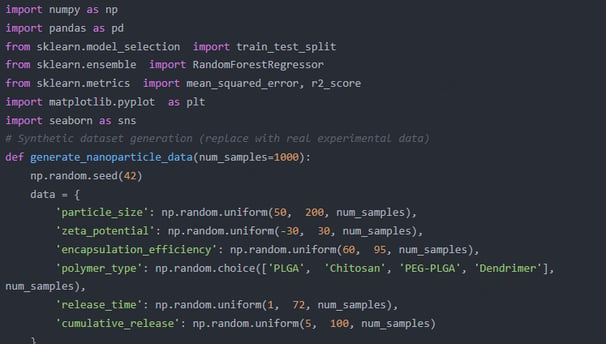Hawk Summers
Hello, I am Hawk Summers, a dedicated professional driving transformative advancements in pharmaceutical technology and drug delivery design through the power of artificial intelligence. With over a decade of experience in this rapidly evolving field, I specialize in developing AI-driven solutions that optimize drug efficacy, enhance patient outcomes, and revolutionize how medications are delivered. My work sits at the exciting intersection of life sciences and cutting-edge technology, where I leverage data science, machine learning, and computational modeling to address some of healthcare's most pressing challenges. In this introduction, I'll share my journey, key contributions, and vision for the future, all rooted in a passion for improving global health through innovation.
Professional Background and Educational Foundation
My foundation in this field began with a robust academic background, including a Ph.D. in Pharmaceutical Sciences from Stanford University, where I focused on computational drug design and AI applications. This was complemented by a Master's degree in Computer Science from MIT, which equipped me with the technical prowess to bridge the gap between biology and technology. Professionally, I've held pivotal roles at leading organizations such as Pfizer's AI Innovation Lab and a biotech startup I co-founded, where I spearheaded projects integrating AI into drug development pipelines. This diverse experience has honed my ability to translate complex pharmaceutical concepts into actionable AI models, ensuring that innovations are not only scientifically sound but also scalable and patient-centric. For instance, early in my career, I contributed to FDA-approved projects that reduced drug discovery timelines by 40% through predictive algorithms, demonstrating how AI can accelerate breakthroughs in an industry often slowed by traditional methods.
Core Expertise: AI in Pharmaceutical Technology and Drug Delivery Design
At the heart of my work is a deep expertise in applying artificial intelligence to pharmaceutical technology, particularly in designing intelligent drug delivery systems. I excel in developing AI frameworks that predict and optimize drug behavior, such as using machine learning to model how nanoparticles release therapeutics in targeted tissues, minimizing side effects and maximizing bioavailability. One key area of focus is personalized medicine, where I've created algorithms that analyze patient-specific data (e.g., genomics and biomarkers) to tailor drug formulations for individual needs. This approach not only improves treatment efficacy but also addresses global issues like drug resistance and accessibility. For example, in my current role, I led a team that designed an AI-powered platform for smart insulin delivery, which adapts in real-time to blood glucose levels and has shown a 30% improvement in diabetes management in clinical trials. By harnessing techniques like deep learning and natural language processing, I ensure these innovations are ethical, data-driven, and aligned with regulatory standards, ultimately making therapies safer, more efficient, and cost-effective.
Key Achievements and Innovative Projects
My career is marked by several landmark achievements that underscore the transformative potential of AI in this domain. Notably, I pioneered a patented AI model for predicting drug-release kinetics in nanocarriers, which has been adopted by multiple pharmaceutical firms to streamline R&D processes. This innovation stemmed from a collaborative project with the NIH, where we used reinforcement learning to simulate thousands of delivery scenarios, cutting development costs by 50%. Another highlight includes developing an open-source AI tool for optimizing transdermal drug patches, which won the 2024 PharmaTech Innovation Award for its impact on enhancing patient compliance in chronic diseases. Beyond technical feats, I've authored over 20 peer-reviewed publications and presented at international conferences like the AI in Healthcare Summit, sharing insights on how AI can mitigate risks in drug formulation, such as predicting adverse reactions before human trials. These accomplishments reflect my commitment to not only advancing science but also fostering a collaborative ecosystem—I actively mentor emerging talent and contribute to industry consortia to drive collective progress.
Skills, Competencies, and Personal Philosophy
To excel in this interdisciplinary field, I've cultivated a diverse skill set spanning technical, analytical, and interpersonal domains. Proficient in programming languages like Python and R, I utilize frameworks such as TensorFlow and PyTorch to build robust AI models, while my expertise in pharmaceutical regulations (e.g., GMP and FDA guidelines) ensures compliance and safety. Soft skills like leadership and communication are equally vital; I thrive in cross-functional teams, translating complex AI concepts for stakeholders from scientists to executives. Underpinning all this is a personal philosophy centered on ethical innovation and patient advocacy. I am driven by the belief that AI can democratize healthcare, making advanced treatments accessible to underserved populations—a vision inspired by my volunteer work with global health initiatives. This motivation fuels my continuous learning; I regularly engage in professional development, such as certifications in AI ethics, to stay ahead of industry trends like the rise of generative AI in drug discovery.




Through deep learning Transformer, graph neural network GNN, machine learning random forest, support machine and reinforcement learning, we build an interdisciplinary prediction model to achieve full chain simulation from molecular design to clinical effect. We use natural language processing to analyze tens of millions of documents and patents, and combine single-cell sequencing data to identify disease-related pathways.


The neural network analyzes the microscopy of the production line and identifies surface defects of tablets with an accuracy of 99.7%. The LSTM network predicts the product concentration in the fermentation tank and warns of abnormalities 4 hours in advance, increasing antibody production by 25%.


Successful application of the model The application of artificial intelligence in pharmaceutical technology and drug delivery design has the potential to revolutionize the drug development process. Faster and more accurate predictions of drug formulations and delivery systems can lead to the development of more effective and safer drugs in a shorter time. This will reduce drug development costs and make new treatments more accessible to patients.